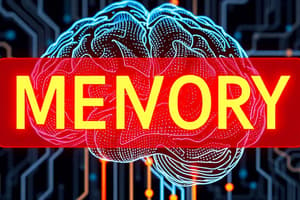Podcast
Questions and Answers
Which scenario exemplifies the 'absent-mindedness' sin of memory?
Which scenario exemplifies the 'absent-mindedness' sin of memory?
- Accidentally using a word you recently learned in every conversation.
- Being unable to recall a familiar actor's name, even though you know it.
- Forgetting the details of a childhood birthday party.
- Misplacing your glasses because you weren't paying attention when you took them off. (correct)
A student studies for an exam in a noisy coffee shop. According to context-dependent memory, where would they likely perform best on the exam?
A student studies for an exam in a noisy coffee shop. According to context-dependent memory, where would they likely perform best on the exam?
- In a setting that is visually similar to the coffee shop.
- It won't matter; context has no impact on memory.
- In a quiet library, free from distractions.
- In the same noisy coffee shop where they studied. (correct)
How does 'elaboration' improve encoding?
How does 'elaboration' improve encoding?
- By linking new information to existing knowledge. (correct)
- By repeatedly rehearsing the information verbatim.
- By creating vivid mental images of the information.
- By dividing information into smaller, manageable chunks.
Which of the following best describes the 'testing effect'?
Which of the following best describes the 'testing effect'?
According to Ebbinghaus's forgetting curve, when is memory loss most rapid?
According to Ebbinghaus's forgetting curve, when is memory loss most rapid?
How does the 'method of loci' enhance memory?
How does the 'method of loci' enhance memory?
What is 'state-dependent memory'?
What is 'state-dependent memory'?
How did Loftus and Palmer demonstrate the 'suggestibility' of memory in their car crash experiment?
How did Loftus and Palmer demonstrate the 'suggestibility' of memory in their car crash experiment?
A person incorrectly remembers reading an article in the New York Times when it was actually from a blog. Which 'sin of memory' is this?
A person incorrectly remembers reading an article in the New York Times when it was actually from a blog. Which 'sin of memory' is this?
What is the primary difference between short-term and long-term memory?
What is the primary difference between short-term and long-term memory?
Which scenario demonstrates the 'bias' sin of memory?
Which scenario demonstrates the 'bias' sin of memory?
How does 'chunking' aid the encoding process?
How does 'chunking' aid the encoding process?
What is the main idea behind the 'spacing effect'?
What is the main idea behind the 'spacing effect'?
Which of the following is the best definition of 'transience' as one of the 7 sins of memory?
Which of the following is the best definition of 'transience' as one of the 7 sins of memory?
Which situation best illustrates the 'generation effect'?
Which situation best illustrates the 'generation effect'?
What did Ebbinghaus use in his memory experiments?
What did Ebbinghaus use in his memory experiments?
Which is the best example of 'persistence', one of the 7 sins of memory?
Which is the best example of 'persistence', one of the 7 sins of memory?
What is the central idea behind 'hierarchical organization' as a memory encoding strategy?
What is the central idea behind 'hierarchical organization' as a memory encoding strategy?
Which of the following scenarios best illustrates the 'self-reference effect'?
Which of the following scenarios best illustrates the 'self-reference effect'?
What is the 'memory paradox'?
What is the 'memory paradox'?
Flashcards
Memory Paradox
Memory Paradox
The idea that memory can be both powerful and flawed.
Mnemonists
Mnemonists
Memory athletes demonstrating the power of memory using techniques like the method of loci.
Method of Loci
Method of Loci
A technique that enhances memory by associating items with specific locations in a familiar space.
Memory
Memory
Signup and view all the flashcards
Sensory Memory
Sensory Memory
Signup and view all the flashcards
Short Term Memory
Short Term Memory
Signup and view all the flashcards
Long Term Memory
Long Term Memory
Signup and view all the flashcards
Encoding
Encoding
Signup and view all the flashcards
Chunking
Chunking
Signup and view all the flashcards
Elaboration
Elaboration
Signup and view all the flashcards
Self-reference effect
Self-reference effect
Signup and view all the flashcards
Hierarchical Organization
Hierarchical Organization
Signup and view all the flashcards
Spacing Effect
Spacing Effect
Signup and view all the flashcards
Forgetting Curve
Forgetting Curve
Signup and view all the flashcards
Retrieval
Retrieval
Signup and view all the flashcards
Testing effect
Testing effect
Signup and view all the flashcards
Generation effect
Generation effect
Signup and view all the flashcards
Context-dependent memory
Context-dependent memory
Signup and view all the flashcards
State-dependent memory
State-dependent memory
Signup and view all the flashcards
Study Notes
- Memory can seem both perfect and flawed, known as the Memory Paradox.
- Eyewitness testimony is often inaccurate despite people's confidence.
- Flashbulb memories, while vivid, can be distorted.
Mnemonists and Memory
- Mnemonists, or memory athletes, demonstrate the power of memory.
- These individuals use the method of loci.
- Method of Loci (Memory Palace): involves placing information in familiar locations to aid recall.
Memory Processes
- Memory: the processes of encoding, storing, and retrieving information.
- Sensory Memory: holds brief sensory impressions.
- Unattended information is lost in less than a second.
- Short Term Memory: responsible for storing information momentarily.
- Unrehearsed information is lost.
- Example: remembering a phone number long enough to dial it.
- Long Term Memory: responsible for storing information for a relatively long time.
- Some information may be lost over time.
Encoding Strategies
- Encoding: mentally processing information to enable later conscious access.
- Chunking: organizing smaller bits of information into larger, meaningful units.
- Elaboration: linking new knowledge with existing knowledge.
- Self-Reference Effect: relating material to oneself.
- Hierarchical Organization: arranging material into a network of associations.
- Example: creating an outline or concept map.
Depth of Encoding and the Spacing Effect
- Depth of Encoding: the degree to which information is encoded.
- Deep encoding is associated with better memory.
- Example: understanding a concept versus memorizing a definition.
- Spacing Effect: studying in shorter, spaced-out sessions instead of cramming.
- Review over days is better than studying everything in one sitting.
Ebbinghaus and the Forgetting Curve
- Ebbinghaus: conducted memory experiments on himself using nonsense syllables.
- Forgetting Curve: information is forgotten rapidly at first, then the rate of forgetting slows.
- Regular review flattens the curve.
Retrieval
- Retrieval: the act of accessing memory.
- Testing Effect: practicing retrieval improves memory.
- Generation Effect: generating items enhances memory compared to memorizing them.
- Context-Dependent Memory: memory is enhanced when the retrieval context matches the learning context.
- State-Dependent Memory: memory is enhanced when internal states match at learning and retrieval.
- Mood-Dependent Memory: People who learned while in a happy or sad mood remembered better when tested in the same mood.
- Drug/Alcohol-Dependent Memory: Memory improved when people studied and were tested while under the same influence.
- Not recommended since downsides outweigh the memory benefits.
The 7 Sins of Memory
- The 7 Sins of Memory are broken into 3 types of failures: "I Forget, I Get It Wrong, I Can't Let Go"
- Forgetting: involves losing the memory.
- Transience: memory decays over time.
- Example: forgetting a 6th grade teacher's name.
- Absent-Mindedness: failure to encode due to inattention.
- Example: losing keys because of not paying attention.
- Blocking: temporary failure to retrieve a memory.
- Example: "tip of the tongue" phenomenon.
- Transience: memory decays over time.
- Distortion: involves remembering incorrectly.
- Misattribution: confusing the source of a memory.
- Example: attributing information to a friend when it was from TikTok.
- Suggestibility: false memories formed by suggestion.
- Example: a witness falsely remembers seeing a weapon after being told there was one.
- Bias: current beliefs change how you remember the past.
- Example: thinking a past fight was clearly the other person's fault.
- Misattribution: confusing the source of a memory.
- Intrusion: involves being unable to forget.
- Persistence: unwanted memories that won't go away.
- Example: reliving a traumatic event.
- Persistence: unwanted memories that won't go away.
Mnemonic Tricks for Remembering Sins of Memory
- Mnemonic Trick: "TAB-MSBP"
- Transience, Absent-mindedness, Blocking, Misattribution, Suggestibility, Bias, Persistence
Loftus and Palmer Experiments
- Participants watched a video of a car accident.
- They were asked about the speed of the cars using different verbs like "smashed" or "hit".
- Results: harsher words like "smashed" led to higher speed estimates.
Studying That Suits You
Use AI to generate personalized quizzes and flashcards to suit your learning preferences.




